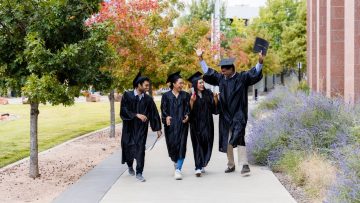Service- and Project-Based Learning: Serve Your Community and Go Outside the Classroom
Learning isn’t confined to the classroom. Many schools have developed relationships with community partners so they can offer service-learning programs to their students in a way that is integrated with certain classes. These are programs that put students into the community as volunteers and interns, allowing them to put their coursework into practice in real-world settings.
By participating in structured volunteer opportunities, students gain valuable experience that can help them plan careers while at the same time giving back to the community.
During and after these experiences, research shows that project-based learning helps students bring their new knowledge to their coursework, providing a deeper understanding and appreciation of their discipline.
Examples of Service-Learning
- Campus-Wide Volunteer Day: Students from across the university gather to provide assistance in a collective manner. Examples include a day helping to build homes, cleaning up waterways, reading to children, or providing meals on a large scale.
- First-Year Community Projects: These are specifically designed for first-year students, and may be one-day or ongoing programs that encourage students to interact with members of their local community.
- Service-Learning Components: Service-learning components are organized courses that require a service-learning element, with a minimum number of hours of volunteering and a reflection exercise. Work-based learning is especially common as a teaching strategy within ‘helping professions’ such as health care, social work, conflict studies, and so on, but are increasingly found in standard academic courses as well.
- Independent Service-Learning Courses: Similar to internships, these courses provide students with long-term opportunities to put their academic knowledge and skills to work within the community, followed up with a paper that synthesizes the experience as part of a student’s academic degree.
- Alternative Spring Breaks: These active learning experiences allow students to test the waters of service, cause-based activism, leadership-building, or relationship-building programs. Alternative spring breaks enrich their lives while giving them a chance to interact with the world by learning outside of the classroom.
Student engagement in the community provides an understanding of marginalized groups and the needs of others that college programs and higher education in general aren’t able to. They are able to observe the issues studied in class first-hand, coming to a better understanding of problems as well as solutions. Students develop teamwork, leadership skills, responsibility, and the value of volunteerism in a cooperative learning environment. Through community engagement, students gain the satisfaction of knowing that their efforts and skills have made a difference.
How does Service-Learning Improve Student Outcomes?
Like other forms of experiential learning, students gain the opportunity to put their academic knowledge to work on real-world challenges and problems. Such experiences complement and reinforce the lessons from their college education while allowing students to test theories and challenge expectations. Students must work with groups of their peers and community members in unstructured environments, forcing them to learn responsibility, organization, teamwork, and leadership. These environments push students to develop necessary problem-solving skills, value civic engagement, develop emotional maturity, and learn to serve their communities. They may also gain an appreciation for different cultures and populations as they confront issues of poverty, racism, environmental issues, crime, and discrimination.
How Schools Implement Service-Learning
Barry University, Miami, FL
At Barry University, the Center for Community Service Initiatives are at the heart of volunteering on campus. They organize activities for faculty, staff, and students to promote social justice. Some of their past projects include building awareness for human trafficking, advocating for farmworkers’ rights, and creating art projects for at-risk teens.
College of Charleston, Charleston, SC
College of Charleston students have the opportunity to participate in alternative spring-break service projects. They may travel to urban areas to help the homeless or provide environmental cleanup, or they can travel to locations such as the Dominican Republic to help with schools. In Charleston, many students also engage in service-learning projects such as the annual MLK Challenge.



